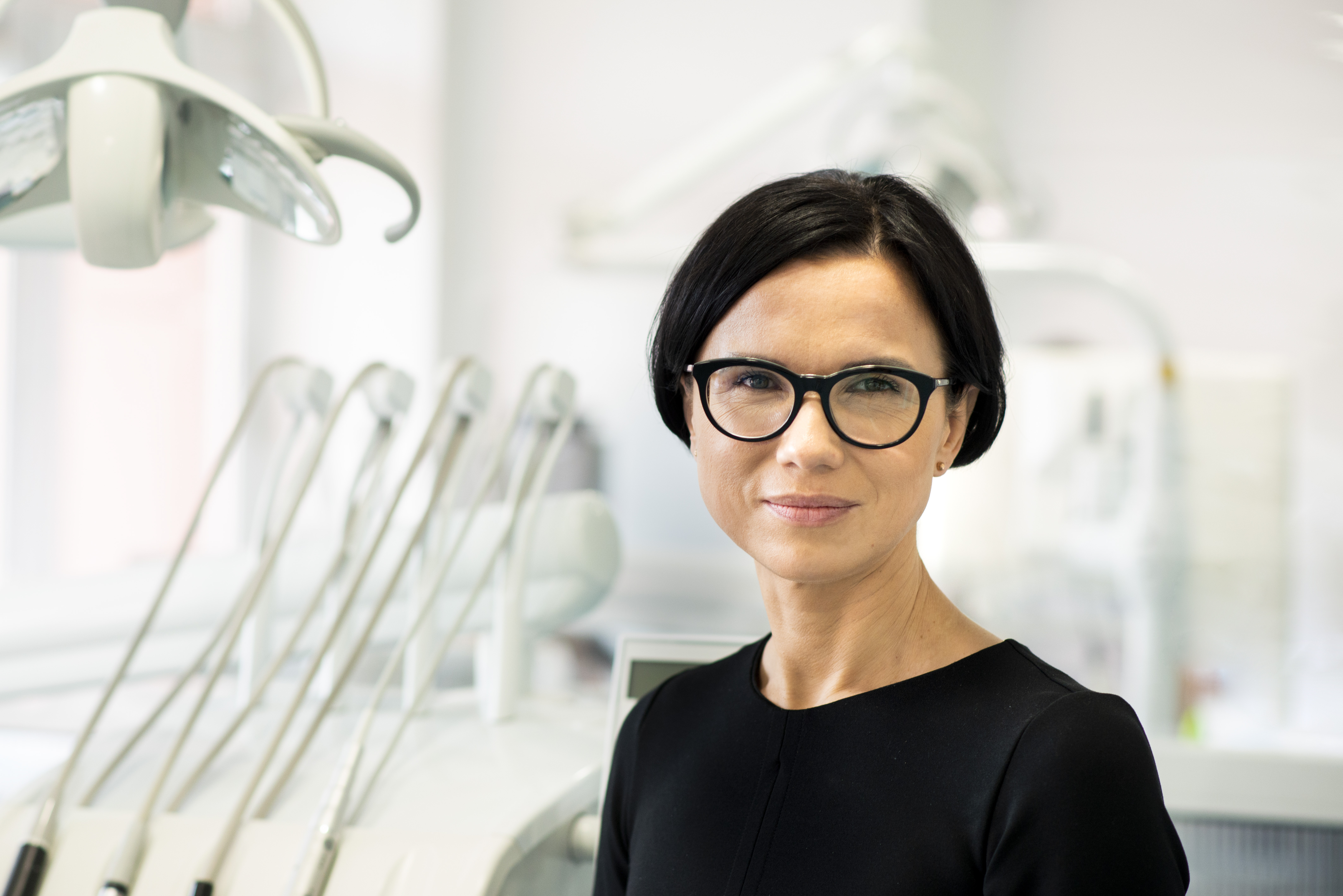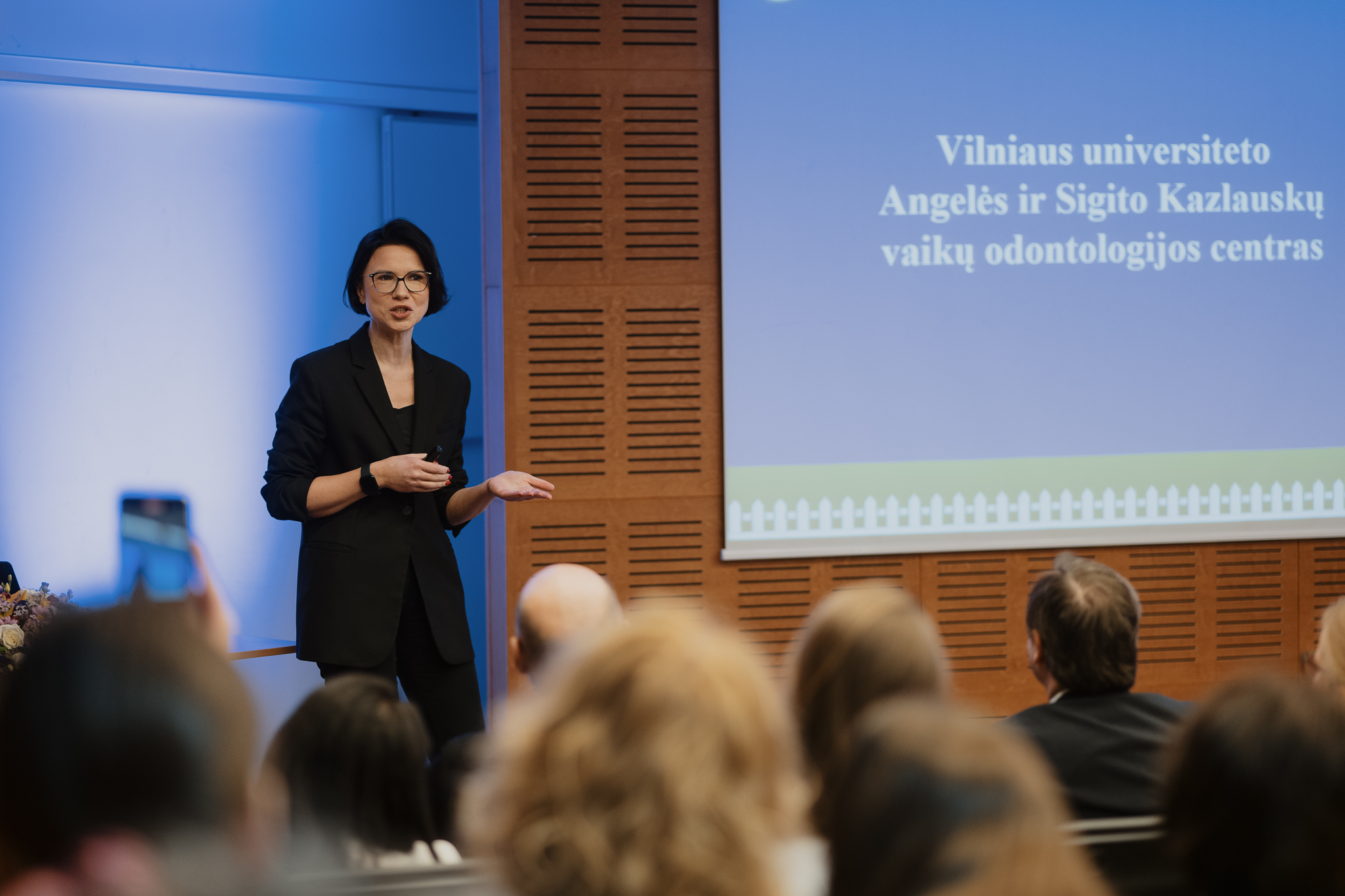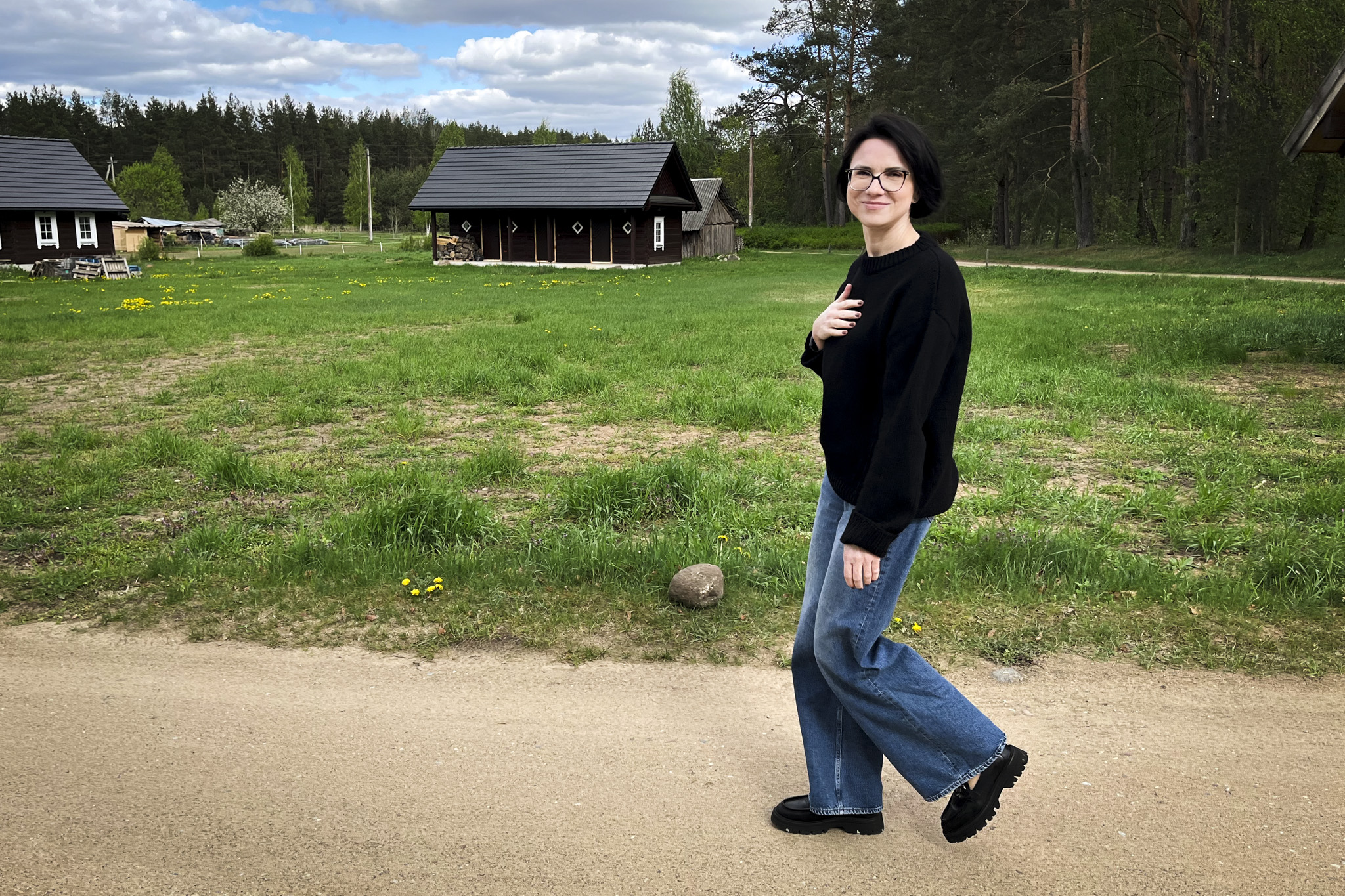Professor V. Brukienė of Vilnius University – On Dentistry, Childhood Dreams, and Today’s Students

This year, the Faculty of Medicine at Vilnius University (VU) is marking a milestone – it will be sending off its 25th graduating class of dentistry students. Professor Vilma Brukienė, a paediatric dentist who has taught many of these students, is also the Director of the Institute of Dentistry and President of the Lithuanian Dental Chamber. She says that she never dreamed of becoming a dentist herself – she once considered following in her parent’s footsteps and becoming a teacher. However, she notes that dentistry is inseparable from teaching and adds that the profession is both demanding and underappreciated in Lithuania. In this interview, Prof V. Brukienė speaks about childhood dreams, perfectionism, leisure time, and her role models.
– Dear Vilma, we’ve escaped the city and the dental office today to have a walk in the hundred-year-old village of Grabijolai. Society often pictures dentists as people who are very particular about cleanliness, sterility, appearance and health. And yet it appears that you, a dentistry professor, love spending time in the countryside. Is this unsterile, non-urban space close to your heart?
– Ironically, I am not at all germ-obsessed or pedantic. So, I guess it’s good that I work in paediatric dentistry—here, contrary to other branches of dentistry that require extreme meticulousness, you first and foremost need psychological communication skills. The countryside has been dear to me since childhood; I used to spend all my summers there. I’d be taken away from the city in June and brought back at the end of August. They sometimes even had to run after me to take me back to the city! Being in the countryside was bliss for me. As a child, I spent a lot of time there alone, by myself or with animals: I’d swaddle kittens and carry them around in handbags. My longing for the country and nature has remained with me to this day. In my current stage of life, I’m secretly nurturing a dream of living somewhere on a homestead with no neighbours in sight. Might this be a consequence of being surrounded by people for many years? I’m an introvert who has learnt to be extroverted. The wish to distance myself from people, from the masses, grows stronger with age. But my daily life moves in the opposite direction: I always have to participate in conferences and events, give presentations, and teach students. It feels like I’m constantly going against my nature.
– What did little Vilma want to do when she grew up? Do you remember your dreams? Did you dream of becoming a professor or a medical practitioner from a young age?
– Becoming a physician, let alone a dentist, was never a dream of mine. When I was little, besides wanting to work as an ice cream seller, I really dreamed of being a trolley bus driver! I remember this vividly: I thought that sitting high in a driver’s seat and slowly rocking behind a huge wheel would be incredibly fun. I still think so, and this is probably where my preferences for my own car come from.
In my youth, I read lots of detective stories, and maybe that’s why I was also fascinated by archaeology, the mystery of it all. In museums, I like to peer into portraits and analyse them; I’m curious to know how those people lived and what they felt. In the evenings, driving down the streets, I catch myself looking into the windows of buildings and thinking: what’s life like for the people inside?
I now realise that my children have entered professions that I would have loved to study – art management, the political sciences, and international relations. A career in acting was also one of my dreams. I was enamoured of theatre: whenever I went to a play, I’d bring flowers and cakes for the actors. I was envious of them having a totally different sense of the world. I feel too artistic for the hard sciences but too exact for the arts – my soul embraces inclinations towards a wide spectrum of contrasting fields.

– Meanwhile, we assume that dentists love their clean, light offices and work there with pleasure all their lives.
– I think that the vast majority of dentists are determined to do their job for their whole life. I graduated high school with honours. I could have enrolled anywhere, but I didn’t have a specific goal. My parents guided me to enrol in dentistry. They wished for the easiest possible living for me (although it’s far from easy): at the time, when private clinics had just started to open, they thought that it was a great profession because I’d have my independence and be able to create a job for myself. My parents were both teachers – if they hadn’t prompted me, I might have chosen the teacher’s path.
When we were doing an internship, we had to pick a speciality. I had intended to become an endodontist. One of our teachers lamented that nobody was choosing children’s dentistry. And then I thought: why not? And so I picked that instead. This was how teaching and dentistry merged together: paediatric dentistry is impossible without pedagogy—how do you negotiate with a child so they’ll open their mouth? This is truly a difficult job and, unfortunately, few people choose it, as it’s not valued enough in Lithuania.
– Your youngest son has followed in your footsteps: not only did he score perfectly on his Matura exams, but he also took up dentistry studies. Did your son’s success bring to mind the way your parents were met with the news that you were about to study dentistry back then? Knowing that your child has decided to follow in your steps probably evokes a full spectrum of different emotions.
– Sadly, my dad didn’t comprehend that I got into studying dentistry because I lost him the same year, and as for my mother, as a teacher, it wouldn’t even have crossed her mind that I wouldn’t get into it. I didn’t interfere with my children’s choices because, however strange that sounds now, I quite recently went through a period myself where, each spring, I would mull over where to enrol and what to study. I suddenly felt that things I already knew and did were not enough for me! I really feel for high-school seniors when they have to make up their minds about the path they want to take. I must admit that even to this day, I don’t know what I truly want to do in life. I don’t feel like I’ve arrived at my final destination yet or that I’ve achieved full self-realisation or career fulfilment.
– This sends a very interesting message to those who are choosing their studies. This year, VU bids farewell to its 25th class of dentists, and you’ve seen and taught them all. These young physicians are only envisaging their career and their life path, but dentistry is not an easy profession, is it?
– That’s right, now they’re faced with very different circumstances and conditions compared to the times when we, their teachers, graduated. Now, the corporate medicine era is coming. When we enrolled, small dental offices were popping up that hadn’t lost their charm for me: they were like boutiques where several family generations were treated; physicians knew everything about the problems of these families and gave personal attention to each individual. Nowadays, the dentistry market in Lithuania is rather saturated, but there’s still a lack of dentists in the region—maybe some future dentists might successfully find their way there. However, every generation has to meet different challenges. Our lecturers told us: ‘Don’t think that you’ll open your pockets and money will fall straight into them.’ And that was indeed true. Dentistry is far from easy, but for many, it seems to be leaning towards business rather than medicine. People even say that we fix rather than treat teeth like a handbag or shoes. And yet, dentistry is a treatment just as medicine is. Future dentists have to have a lot of general and medical knowledge: teeth aren’t something you can just take out and put in; they connect to the rest of the body via all the systems.

– Do you see some differences between the freedom of choice of the earlier generations and the current youth? The decision of where to study used to be made after consulting one’s parents. What is motivating young people to pursue a career in dentistry now?
– Dentistry attracts students with the highest academic marks. And I have a theory of why that is: dentists are freer and more independent in their professional life. Medical students study longer; the majority become attached to a hospital that has specialist equipment. But dentists become independent of their environment rather soon, and that’s attractive to contemporary youth. Their work is clear and predictable – they are the only ones who have professional self-governance. There should be considerably less mobbing and discrimination in dentistry because it relies less on public funding or appointed positions, and there isn’t a way for a hierarchy to form.
Some students are driven by the idea of treating children or practising the prevention of oral disease; others want to become implantologists or surgeons right from the start, but the path always changes somewhat. There have been students in their thirties who enrolled after having acquired a completely different profession, say that of an actor. Nowadays, that’s normal. I admire young people’s enthusiasm—let them make mistakes in their choices! Our parents’ generation was used to setting a fixed track that they followed from graduation up to retirement, whereas now students are free to choose and divide their life into stages. I myself would really like my life to present me with brand-new challenges.
Nevertheless, I have encountered students who openly stated that they simply wanted to hand their parents a diploma and then turn to their own path. I know that that’s not great – I experienced something similar myself. In my childhood, my parents were eager to keep me constantly occupied so that I wouldn’t roam the streets, so I started attending a music school. I wanted to drop out, but they wouldn’t let me. After seven years, I finished it, closed my piano and never opened it again. It’s no use if a child wants to be a stage director but is forced to take up medicine, dentistry, or law studies. Even if parents sincerely wish the best for them, I meet students who certainly won’t do this job.
– Those who devoutly tend to children’s health are full of love. Often, that love is even bigger than the person is able to express outwardly. Going home after a workday, do you get lost in your thoughts, replaying the day in your head again? Some say that this rumination is like a relived love, which comes from a deep concern for every person and meticulous care for every detail.
– I’m constantly replaying the day’s events, even at night. I have a tendency to self-reproach, especially if I’m not sure whether I did everything right. I’m aware that nothing will change if I replay the events for the hundredth time. I’ll simply conclude again that I could have acted differently, but that still won’t have altered the result.
– However, I have seen a dental surgeon who, at the moment of bringing back a child who was waking up from anaesthesia after surgery to hand over to their mother, was looking at the child rather than into the mother’s eyes. The look he gave was very brief yet brimming with pure concern.
– Indeed, most physicians probably have that feeling, but they can’t express it due to time constraints. I’m not sure how many practitioners have that daily thought that their work is to rescue people. I think they’re just plugging away, and only occasionally do they reflect on the value of it all. You can do a heroic deed only once or twice in your life. It’s that humble, daily, monotonous grind that the true value lies in, and that makes the world go around. If medical work were more appreciated and physicians had more rest, then it would be the happiest profession. Dentists rarely encounter a matter of life or death, but they save people from pain and give them an opportunity to chew properly, and that is really important.
– Are dentistry students nowadays taught the so-called soft skills, i.e., to empathise, smile, how approach and comfort the little patient, or is this considered a natural gift, meaning that future physicians’ competencies will only be as good as they are innately compassionate?
– It would be wonderful if every dentist had a natural inclination for gentleness. We teach law, ethics, and psychology as separate subjects, but the students foster their communication skills every day with every new patient. I fondly remember the time when students would go to an orphanage, get a car full of children and bring them to a clinic for treatment. I couldn’t help but admire the sight of some big, strong guy, a future surgeon or implantologist, who had no intention of fussing with children in his career, standing in the clinic surrounded by kids, wiping a child’s nose, taking another to the toilet. It’s truly worth being alive for moments like these.
I sincerely hope that our student dentists, having taken children for treatment from time to time, remember how to talk to them and perhaps give them a small gift of some kind. They need to see that not everything comes down to money; sometimes, you have to do voluntary work. With the Angelė and Sigitas Kazlauskas Paediatric Dentistry Centre that opened this year, students will be able to carry out even more treatments and have even more contact with children. Sometimes, a student receives a child who a greatly experienced dentist has been unable to treat and who is set for treatment under sedation or general anaesthesia. Then, that student manages to calm the child down and talk them into opening their mouth! It’s not experience or manual skills that are the most important, but connection, wanting to help, and positive energy. I imagine that such an experience stays with those who study there for a long time.

– Is it true that one can only become a medical practitioner if one has very strong character traits? Your own life path and achievements suggest that perfectionism and maximalism aren’t foreign to you. Which stage of your life would you trace these qualities back to, or are they simply inherited?
– I got my perfectionism from my parents, no doubt. I don’t recall them sitting me down and lecturing me, and it happened implicitly. Children instinctively feel their parents’ emotions: for example, when children come for a dental appointment, but their parents are afraid of dental treatment, they immediately take on that fear. My father was a headmaster, and my mother was a deputy head, so high expectations were always in the air. I felt like I didn’t have the right to bring home anything but the highest grade, although no one ever said that to me. I’ve always been the harshest judge of myself – perfectionists don’t need critics. They punish themselves for every minute detail. I have a feeling that my brain never shuts off because I sometimes wake up in the middle of the night thinking about how to solve this or that problem.
– Did you pass down some of these traits to your children or your students? Or did you, on the contrary, have recognised the seed of perfectionism in your children and tried to temper it?
– Unfortunately, I didn’t. I must admit I realised too late that I had passed down to my children the pattern of setting high expectations for oneself and aiming for perfect results. I now see grown-up perfectionists. Some of that might be genetic, but I also must take responsibility: I require too much from them. I really hope that I have actually changed and can set a new example for my children. The work environment finds perfectionists very convenient – everybody loves working with them except the perfectionists themselves. They will do everything perfectly at the expense of their own rest. As a manager, I can say that there are fewer and fewer employees like that. But that’s good news: non-perfectionists are happier people.
– Today, we’re walking down the well-trodden village paths that have been developing for hundreds of years. And you, yourself, do you like taking the well-travelled road, or are you still treading your own path?
– I’m not sure if paths can be altogether new. I’m a stubborn Samogitian from the region of Samogitia—if someone directs me to do something, I act differently on purpose, even if I regret it later! Driving my car, I always pick the worst route possible through forests and swamps – off-road, as it were. I love driving, going wherever the wind takes me. I want to feel danger, although I’m not at all a daredevil (I would certainly not go skydiving!). I’m not one bit scared of getting lost in a forest, except maybe getting my car stuck somewhere off-road. But even if I am afraid, I’ll still do it. I guess I act in a similar fashion in both my life and my career.
I believe that life puts everything in the right place. I was once really sorry when I didn’t get what I really wanted, but then everything eventually turned out to my own benefit. If something looks grim today, there will be some kind of meaning, and it will turn into something really good, even if at that moment you don’t get why something happened. Whatever I chased, giving my blood, sweat, and tears, I didn’t get it. However, all life’s gifts came to me on their own. Every person is a master of their own fate, and our task is simply to do our work with integrity, and someone from above will steer our path while we do it.
– What is your daily routine? What challenges does working with patients pose to you?
– Although I have been working for many years and I feel confident about my competencies, I still look at each patient as a completely new story – they aren’t a statistical unit to me. Right at the beginning of my career, I would remember each of my patients for many years. Recalling every patient now is a luxury for dentists, but we do our job as best as we can every time, anyway. The biggest success for me is when children who have been seen by many colleagues and have resisted treatment open their mouths to me. It sometimes seems that two specific people – the child and the physician – have to meet in order to reach the goal. My record for the time spent convincing a child is two hours. However, physicians don’t always have space and time for that. Sometimes, parents’ help is vital. There was an instance when all the negotiation methods had been exhausted, and the child’s mother finally said: ‘Alright then, I’ll buy you that hamster!’ Her child submitted to being treated without any problems.
– What do you like doing when you are not working? How much time in your life is available for relaxation and reflection, and do you grant yourself some moments of serenity? More generally, how much does inner inertia at work hinder or help you to sort out your priorities in life?
– I can spend the whole day on a sofa with a book. I like travelling around Lithuania and abroad. I’m keen on the countryside. I try to actively celebrate any occasion, including my birthday: go on a hike, visit something, climb, walk, experience. Being with my children is really important to me because there’s less and less of that. I’ll go anywhere with them if they’ve agreed to spend their free time with me.
Of course, inner inertia at work hinders me because I put mental pressure on myself. It feels like if I don’t do something, I won’t keep up with developments. It’s as if we’re in a rat race, in which, to be honest, I don’t want to take part. But I still naively tell myself that I’ll run for a bit longer, and then I will start living!
– Who were and are your idols?
– In contrast to Western Europe, dentistry in Lithuania is a female-dominated profession, so I was mostly taught by women. When I was young, all my teachers were my idols, and my parents, naturally, were my greatest role models for some time. Later, once you’re mature, you can look back and assess how it actually was. University professors can serve as role models on a professional plane, but they won’t become your idols in general. Professor Irena Balčiūnienė was a role model for many teachers at our institute, including me. Now, students have plenty of critical thinking skills; they don’t put their professors on a pedestal; they challenge them often, and that’s great.
In the time given to us, we must take a nugget of wisdom from each of our role models and mould ourselves in this way. Today, my children are my idols, however strange that may sound. I learn from them a lot; they push me not to settle. Every generation brings a new perspective and a new understanding. I, too, feel vulnerable and know that I don’t know everything. Well, you can’t be strong forever, can you?